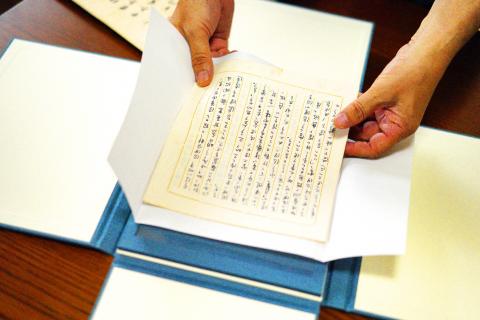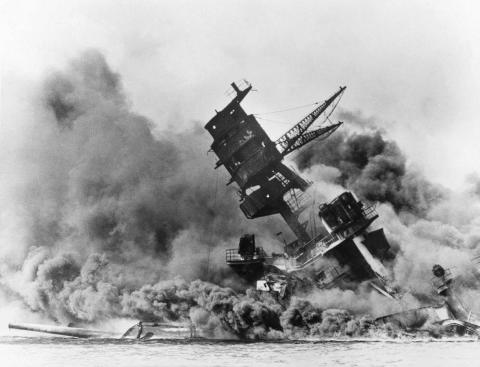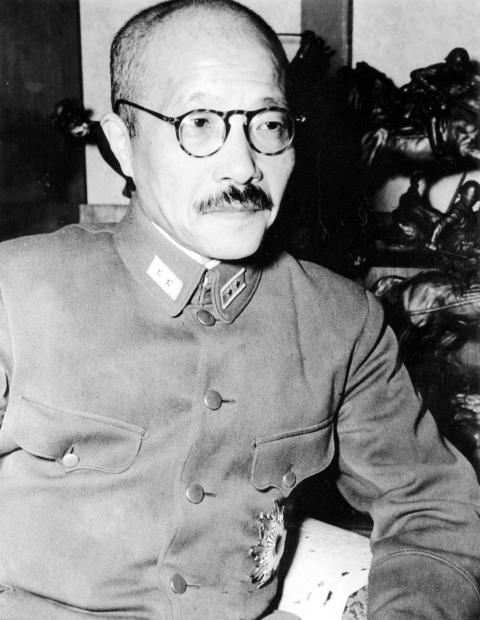A newly released memo by a wartime Japanese official provides what a historian said is the first look at the thinking of Japanese Emperor Hirohito and then-Japanese prime minister Hideki Tojo on the eve of the Japanese attack on Pearl Harbor that thrust the US into World War II.
While far from conclusive, the five-page document lends credence to the view that Hirohito bears at least some responsibility for starting the war.
At 8:30pm in Tokyo, just hours before the attack, Tojo summoned two top aides for a countdown to war briefing. One of them, then-Japanese vice minister of the interior Michio Yuzawa, wrote an account three hours after the meeting was over.

Photo: AP
“The emperor seemed at ease and unshakable once he had made a decision,” he quoted Tojo as saying.
To what extent Hirohito was responsible for the war is a sensitive topic in Japan and the bookseller who discovered the memo kept it under wraps for nearly a decade before releasing it to the Yomiuri Shimbun newspaper, which published it earlier this week.
Hirohito was protected from indictment in the Tokyo war crimes trials during a US occupation that wanted to use him as a symbol to rebuild Japan as a democratic nation. He died in 1989 at age 87, after 62 years on the throne.

Photo: AP
“It took me nine years to come forward, as I was afraid of a backlash,” said bookseller Takeo Hatano, who handled the document carefully as he showed it to reporters. “But now I hope the memo would help us figure out what really happened during the war, in which 3.1 million people were killed.”
Takahisa Furukawa, a Nihon University expert on wartime history who has confirmed the authenticity of the memo, called it the first detailed portrayal of Tojo and Hirohito just before the attack.
Palace documents have confirmed Hirohito’s daytime meeting with Tojo on Dec. 7, 1941, but without elaborating.

Photo: AP
The memo supports the view that Hirohito was not as concerned about waging war on the US as was once portrayed, Furukawa said.
The emperor had endorsed the government’s decision to scrap diplomatic options at a Dec. 1 meeting and his unchanged position the day before the attack reassured Tojo.
Yuzawa’s account portrays Tojo as upbeat and feeling a sense of accomplishment after all the required administrative steps for war had been taken and, most importantly, Hirohito had given him the final nod without asking any questions.
“If His Majesty had any regret over negotiations with Britain and the US, he would have looked somewhat grim. There was no such indication, which must be a result of his determination,” Tojo is quoted as saying in the memo. “I’m completely relieved. Given the current conditions, I could say we have practically won already.”
His optimism was misplaced. The Pearl Harbor attack killed nearly 2,400 US service personnel and caused major damage to the US Pacific Fleet. However, within months the tide was turning.
Tojo was blamed for prolonging the war after it was clearly lost, leading to the US atomic bombings of Hiroshima and Nagasaki in August 1945. He was later executed as “Class-A” war criminal.
Tojo, whose administrative skills and loyalty had won Hirohito’s trust, was made prime minister just two months before the Pearl Harbor attack and served in the post for most of World War II.
Furukawa said that Tojo’s remarks in the memo about his relief at completing the preparations for war support evaluations of him as a good bureaucrat, but not a visionary leader.
More decisive leadership might have ended the war earlier, he said.
“Tojo is a bureaucrat who was incapable of making his own decisions, so he turned to the emperor as his supervisor. That’s why he had to report everything for the emperor to decide. If the emperor didn’t say no, then he would proceed,” Furukawa said. “Clearly, the memo shows the absence of political leadership in Japan.”
Yuzawa wrote in the memo that he was “moved and honored to get involved in war preparations at the time of a crucial event that would determine the fate of the Imperial state.”
He was later promoted to minister of the interior. but turned critical of Tojo’s leadership and was dismissed from the Cabinet over a policy difference.
“He is a man of passion and loyalty,” Yuzawa wrote of Tojo in a notebook he kept. “But he is so narrow-minded and he has no philosophy as a political leader.”
Hatano, a longtime acquaintance of some of Yuzawa’s descendants, received the notebook and other items from family members when they wanted to make room in their apartment. He found the memo folded in half inside the notebook about a year later.
“When I recognized the date, Sunday, Dec. 7, 1941, I knew it was something special,” he said.
He examined it repeatedly to try to make sense of the handwriting and archaic language.
“Then I spotted references to the emperor and prime minister Tojo,” he said.

The collapse of the Swiss Birch glacier serves as a chilling warning of the escalating dangers faced by communities worldwide living under the shadow of fragile ice, particularly in Asia, experts said. Footage of the collapse on Wednesday showed a huge cloud of ice and rubble hurtling down the mountainside into the hamlet of Blatten. Swiss Development Cooperation disaster risk reduction adviser Ali Neumann said that while the role of climate change in the case of Blatten “still needs to be investigated,” the wider impacts were clear on the cryosphere — the part of the world covered by frozen water. “Climate change and

Poland is set to hold a presidential runoff election today between two candidates offering starkly different visions for the country’s future. The winner would succeed Polish President Andrzej Duda, a conservative who is finishing his second and final term. The outcome would determine whether Poland embraces a nationalist populist trajectory or pivots more fully toward liberal, pro-European policies. An exit poll by Ipsos would be released when polls close today at 9pm local time, with a margin of error of plus or minus 2 percentage points. Final results are expected tomorrow. Whoever wins can be expected to either help or hinder the

Packed crowds in India celebrating their cricket team’s victory ended in a deadly stampede on Wednesday, with 11 mainly young fans crushed to death, the local state’s chief minister said. Joyous cricket fans had come out to celebrate and welcome home their heroes, Royal Challengers Bengaluru, after they beat Punjab Kings in a roller-coaster Indian Premier League (IPL) cricket final on Tuesday night. However, the euphoria of the vast crowds in the southern tech city of Bengaluru ended in disaster, with Indian Prime Minister Narendra calling it “absolutely heartrending.” Karnataka Chief Minister Siddaramaiah said most of the deceased are young, with 11 dead

DENIAL: Musk said that the ‘New York Times was lying their ass off,’ after it reported he used so much drugs that he developed bladder problems Elon Musk on Saturday denied a report that he used ketamine and other drugs extensively last year on the US presidential campaign trail. The New York Times on Friday reported that the billionaire adviser to US President Donald Trump used so much ketamine, a powerful anesthetic, that he developed bladder problems. The newspaper said the world’s richest person also took ecstasy and mushrooms, and traveled with a pill box last year, adding that it was not known whether Musk also took drugs while heading the so-called US Department of Government Efficiency (DOGE) after Trump took power in January. In a